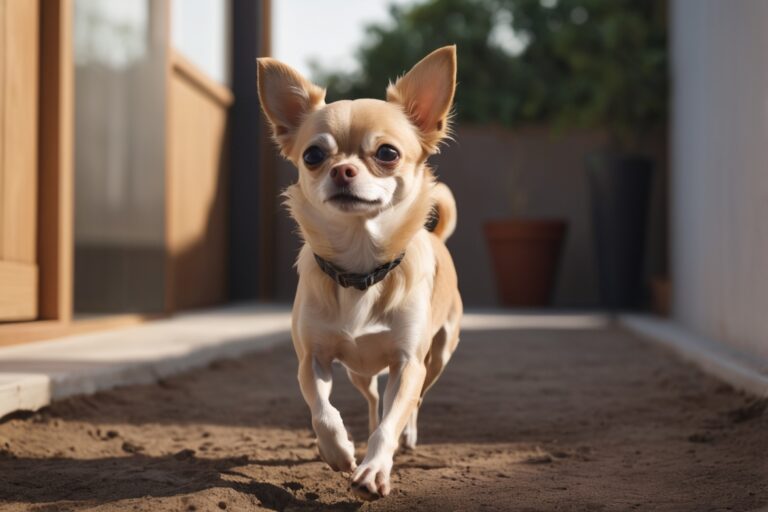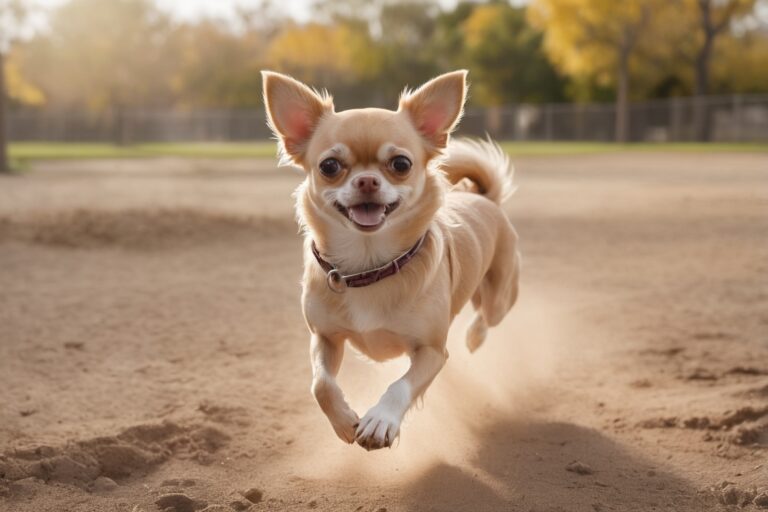Dealing with Bad Smells in Chihuahuas

Chihuahuas are known for their playful and loving nature, but sometimes they can develop bad smells that leave owners wondering what went wrong. Odors can be caused by a variety of issues, ranging from skin problems to dental issues. Understanding the root cause of these unpleasant smells is essential for taking effective action to eliminate them and keep your Chihuahua smelling fresh and healthy
Key Takeaways:
- Bad smells in Chihuahuas can originate from a variety of sources, including skin issues, ears, and dental problems. Identifying the source is key to solving the problem.
- Proper grooming, ear cleaning, and oral hygiene can prevent many common odor issues. Maintaining good hygiene is crucial for keeping your Chihuahua odor-free.
- When dealing with bad smells, it’s important to take a proactive approach and address issues early to prevent them from worsening and impacting your Chihuahua’s health.
1. Common Causes of Bad Smells in Chihuahuas
There are several common reasons why your Chihuahua may develop an unpleasant odor. Understanding the underlying cause can help you determine the most effective way to eliminate the smell and prevent it from returning.
- Skin Issues: Skin problems are a leading cause of bad smells in Chihuahuas. Conditions such as allergies, infections, or skin fold dermatitis can lead to a foul odor. Chihuahuas are particularly prone to skin issues, especially if they have folds or areas of excessive moisture, which can create an environment for bacteria and yeast to thrive.
- Ear Infections: Ear infections are another common cause of bad odors. Chihuahuas have small ear canals that can easily trap moisture and become a breeding ground for bacteria and yeast. If your Chihuahua’s ears have a strong, unpleasant smell, it could indicate an infection that requires treatment.
- Dental Issues: Dental problems are also a frequent cause of bad odors in Chihuahuas. Plaque and tartar buildup, gum disease, and tooth decay can all lead to foul-smelling breath. Maintaining good oral hygiene is essential for keeping bad smells at bay and ensuring your Chihuahua’s overall health.
| Cause of Odor | Description | Notes |
|---|---|---|
| Skin Issues | Allergies, infections, skin folds | Keep skin clean and dry |
| Ear Infections | Bacteria and yeast growth in ears | Clean ears regularly |
| Dental Problems | Plaque, tartar, and gum disease | Brush teeth and check for issues |
1.1 Skin Issues and Odors
Skin issues are a major contributor to bad smells in Chihuahuas. Conditions such as allergies, fungal infections, and skin fold dermatitis can create an environment where bacteria and yeast thrive, resulting in an unpleasant odor. Chihuahuas with skin folds are particularly susceptible to these issues because moisture can become trapped in the folds, creating the perfect breeding ground for bacteria.
One of the most common skin issues that lead to odor is dermatitis. Dermatitis can occur due to allergies, irritants, or excessive moisture on the skin. If you notice redness, flakiness, or an unpleasant smell coming from your Chihuahua’s skin, it’s important to address the issue promptly. Regular bathing and keeping the skin dry can help prevent these problems from developing.
1.2 Ear Infections
Ear infections are a frequent cause of bad smells in Chihuahuas. Their small, sensitive ears are prone to trapping moisture, which can lead to the growth of bacteria and yeast. This often results in a strong, musty odor coming from the ears, along with symptoms such as head shaking, scratching, and discharge.
To prevent ear infections, it is important to clean your Chihuahua’s ears regularly using a vet-recommended ear cleaner. Avoid letting water enter the ears during baths, as this can increase the risk of infections. If you notice a foul smell coming from your Chihuahua’s ears, consult your veterinarian for proper treatment.
1.3 Dental Problems
Dental issues are a common cause of bad odors in Chihuahuas, particularly bad breath. Plaque and tartar buildup can lead to gum disease, tooth decay, and bacterial growth, all of which contribute to foul-smelling breath. Maintaining proper dental hygiene is crucial for preventing these issues.
To prevent dental problems, brush your Chihuahua’s teeth regularly using a dog-specific toothbrush and toothpaste. Dental chews can also help reduce plaque buildup. If your Chihuahua’s breath smells unusually bad, it may be a sign of a dental issue that requires veterinary attention.
1.4 Anal Gland Issues
Another cause of bad smells in Chihuahuas is anal gland issues. The anal glands are located on either side of the rectum and produce a smelly secretion that is usually expelled during bowel movements. However, if the glands become impacted or infected, they can produce a strong, fishy odor.
Signs of anal gland problems include scooting, licking the rear area, and a strong smell. If you suspect that your Chihuahua has an anal gland issue, it is important to have the glands checked and expressed by a veterinarian. Regular check-ups can help prevent problems with the anal glands.
2. How to Address and Eliminate Bad Odors

Addressing bad odors in Chihuahuas requires identifying the underlying cause and taking appropriate action. Whether it’s related to skin, ears, or dental issues, the key is to be proactive in managing the problem.
2.1 Regular Grooming
Regular grooming is essential for keeping your Chihuahua clean and odor-free. Bathing your dog every few weeks with a mild, dog-specific shampoo can help remove dirt, bacteria, and excess oils that may contribute to bad smells. Pay special attention to areas that are prone to moisture, such as the folds of the skin and the ears.
In addition to bathing, regular brushing helps remove loose fur and dirt, preventing odors from developing. Grooming also provides an opportunity to inspect your Chihuahua for any signs of skin issues or infections that could be causing an unpleasant smell.
2.2 Ear Cleaning
Cleaning your Chihuahua’s ears regularly is important for preventing ear infections and eliminating bad odors. Use a vet-recommended ear cleaner and a soft cloth or cotton ball to gently clean the outer part of the ear. Avoid inserting anything into the ear canal, as this can cause injury or push debris further inside.
If your Chihuahua is prone to ear infections, consider cleaning their ears once a week to keep them dry and free from bacteria and yeast. Keeping the ears clean and dry is one of the most effective ways to prevent odors from developing.
2.3 Dental Hygiene
Maintaining good dental hygiene is crucial for preventing bad breath and ensuring your Chihuahua’s overall health. Brushing your Chihuahua’s teeth regularly helps remove plaque and tartar, which are major contributors to bad odors. Use a toothbrush and toothpaste designed specifically for dogs, as human toothpaste can be harmful to pets.
In addition to brushing, consider providing dental chews or toys that help reduce plaque buildup. Regular dental check-ups with your veterinarian can also help identify and address any dental issues before they become severe.
2.4 Addressing Anal Gland Problems
If your Chihuahua has a fishy odor, it may be due to anal gland issues. Anal glands can become impacted or infected, leading to a strong smell that is difficult to ignore. If you notice signs such as scooting or excessive licking of the rear area, it’s important to have your veterinarian check the anal glands.
Your veterinarian can manually express the glands to relieve the pressure and eliminate the odor. In some cases, dietary changes or medication may be recommended to help prevent future issues with the anal glands.
| Grooming Task | Purpose | Frequency |
|---|---|---|
| Bathing | Remove dirt, bacteria, excess oils | Every 3-4 weeks |
| Ear Cleaning | Prevent ear infections and odors | Once a week (if prone to infections) |
| Teeth Brushing | Reduce plaque and prevent bad breath | 2-3 times per week |
3. Preventing Bad Smells in the Future

Prevention is always better than cure, and by taking proactive measures, you can keep your Chihuahua smelling fresh and healthy. Consistent care is key to preventing odors from developing in the first place.
- Regular Grooming Routine: Maintaining a regular grooming routine is essential for preventing bad smells. Bathing, brushing, and ear cleaning should all be part of your Chihuahua’s grooming schedule to keep them clean and odor-free. Regular grooming also helps prevent skin issues and infections that can lead to bad smells.
- Keep Skin and Ears Dry: Moisture is a common cause of odors in Chihuahuas, especially in the ears and skin folds. After baths or exposure to water, make sure to thoroughly dry your Chihuahua to prevent moisture from becoming trapped. Use a soft towel to gently dry the ears and folds, and consider using a blow dryer on a low setting if necessary.
- Monitor for Signs of Problems: Keeping an eye out for signs of problems can help you address issues before they lead to bad smells. Regularly inspect your Chihuahua’s skin, ears, and mouth for any signs of redness, swelling, or discharge. Catching problems early can prevent them from becoming more serious and causing unpleasant odors.
3.1 Regular Grooming Routine
Maintaining a regular grooming routine is one of the most effective ways to prevent bad smells in your Chihuahua. Grooming should include regular baths, brushing, ear cleaning, and nail trimming. By keeping your Chihuahua clean, you can prevent the buildup of bacteria and other factors that contribute to odors.
Grooming also provides an opportunity to inspect your Chihuahua for any potential issues, such as skin irritations or ear infections, that could be causing bad smells. A consistent grooming schedule helps ensure that any issues are caught and addressed before they become more serious.
3.2 Keeping Skin and Ears Dry
Moisture is a major contributor to odors, particularly in the ears and skin folds. After bathing your Chihuahua, be sure to dry them thoroughly to prevent moisture from becoming trapped. Use a soft towel to dry the ears, skin folds, and any other areas prone to moisture.
For Chihuahuas with skin folds, keeping these areas dry is especially important. Moisture can easily become trapped in the folds, creating an environment where bacteria and yeast can thrive. Keeping the skin dry helps prevent infections and the associated bad smells.
3.3 Monitor for Signs of Infection
Monitoring your Chihuahua for signs of infection is an important part of preventing bad smells. Regularly inspect your Chihuahua’s skin, ears, and mouth for any signs of redness, swelling, or discharge. If you notice any signs of a problem, such as an unusual smell or discomfort, consult your veterinarian for further evaluation.
Early detection of issues can prevent them from becoming more serious and causing unpleasant odors. Regular check-ups and monitoring help ensure that your Chihuahua remains healthy and odor-free.
3.4 Use Vet-Recommended Products
Using vet-recommended products for grooming and cleaning can help prevent bad smells. Choose shampoos, ear cleaners, and dental products that are specifically designed for dogs and recommended by your veterinarian. These products are formulated to address the unique needs of your Chihuahua and help keep them clean and healthy.
Avoid using human products on your Chihuahua, as they may contain ingredients that can irritate their skin or cause allergic reactions. Vet-recommended products are safe and effective for preventing odors and keeping your Chihuahua smelling fresh.
Conclusion
Chihuahuas can develop bad smells for a variety of reasons, including skin issues, ear infections, dental problems, and anal gland issues. Understanding the underlying cause of the odor is key to addressing the problem and preventing it from returning. By maintaining a regular grooming routine, keeping your Chihuahua’s skin and ears dry, and using vet-recommended products, you can keep your Chihuahua smelling fresh and healthy. If you notice any unusual smells or signs of discomfort, consult your veterinarian for further evaluation and treatment.
Frequently Asked Questions (FAQ)
- Why does my Chihuahua have a bad odor?
Bad odors can be caused by skin issues, ear infections, dental problems, or anal gland issues. - How can I prevent my Chihuahua from developing bad smells?
Regular grooming, keeping the skin and ears dry, and monitoring for signs of problems can help prevent bad odors. - What should I do if my Chihuahua’s ears smell bad?
If your Chihuahua’s ears have a foul odor, it may indicate an infection. Clean the ears with a vet-recommended cleaner and consult your veterinarian for further treatment. - How often should I bathe my Chihuahua to prevent bad smells?
Bathing your Chihuahua every 3-4 weeks with a mild dog shampoo can help prevent odors. Avoid over-bathing, as it can dry out their skin. - Can dental issues cause bad smells in Chihuahuas?
Yes, dental problems such as plaque buildup and gum disease are common causes of bad breath in Chihuahuas.






